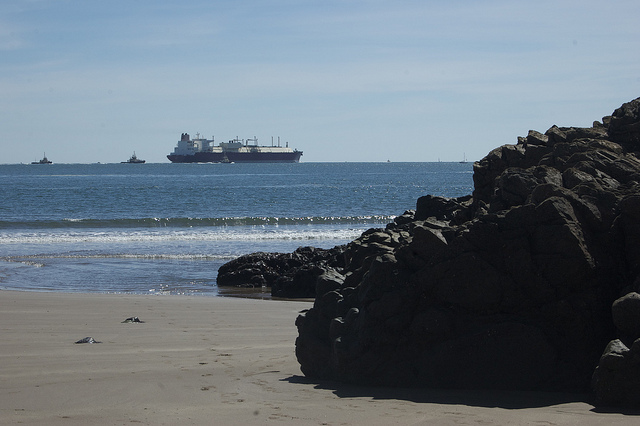
Photo credit: Simon Wood via flickr
Both Malaysian state-owned oil major Petronas and the British Columbia (BC) provincial government refuse to throw in the towel on the Petronas-led C$36 billion (US$32 billion) Pacific Northwest LNG project in BC. On Friday, Petronas said that in the coming weeks it will announce a “conditional” final investment decision (FID) on its proposed terminal. The all-important FID must be reached before funding can be secured to construct an LNG project.
Petronas’ surprising announcement comes just two days after it reached a project development agreement with the BC government. The agreement spells out broad terms for taxes and LNG rules. Both the Petronas FID disclosure and the Petronas-BC agreement caught many off guard, while the timing of these developments could either be considered a stroke of brilliance if you are pro-energy development, or very bad timing if you are concerned about the project’s environmental impact.
In fact, an argument can be made that the two disclosures are rather bold. They come just two weeks after the Lax Kw’alaams band, a First Nations group, overwhelmingly rejected a seemingly generous C$1 billion (US$820.9 million) deal in return for the band’s support of the export terminal. The band said that the development would harm a fish habitat next to the project site. After the rejection, many claimed that the project was dead in the water, while others claimed aboriginal consent was important, although not necessary for the project to go forward.
Petronas did, however, acknowledge First Nations in its recent conditional FID statement. “We will continue to have constructive engagements with the First Nation, and keep all avenues open as we move forward with our project,” the company said.
The Petronas-BC preliminary agreement also caught several other First Nations groups by surprise. In a somewhat terse press release issued the next day, the leadership of Fort Nelson First Nation, Prophet River First Nation and West Moberly First Nations, said they were “astonished” by the agreement. “In yet another example of the Province ignoring First Nations’ constitutionally-protected rights, at no point were the Treaty 8 First Nations consulted on the project development agreement (PDA) or the long-term royalty agreement (LRTA). The agreements are intended to secure a positive final investment decision on the Pacific NorthWest LNG export facility,” the press release said.
“They [Pacific Northwest Project activities] will compromise our territory and treaty rights for generations,” the release added. Other First Nations groups are also protesting the proposed Trans Canada pipeline that would be built to support the Petronas-led LNG project.
However, the project may actually (amid its December postponement by Petronas over provincial regulatory and tax issues, and now struggles to get aboriginal consent) be missing a rapidly closing window of opportunity. Australia has three new LNG export projects in operation and seven more under construction and will soon over take Qatar as the world’s largest LNG exporter in terms of liquefaction capacity. A new LNG export facility in Papua New Guinea came on stream last year. In the US four LNG projects are under construction and Cheniere Energy’s Sabine Pass facility on the Gulf of Mexico will export first gas at the end of the year. All of these countries and projects are earmarked to tap into LNG markets in Asia Pacific, which currently accounts for around two-thirds of global LNG demand. In essence, they all beat BC out of the gate in the heated LNG race.
A report two weeks ago by the London-based Oxford Institute for Energy Studies agrees. The report stated that the opportunity for proposed BC LNG projects to capture Asian markets has eluded these projects and as a consequence it’s unlikely that any BC LNG projects will likely be commissioned or economic for another decade. This must be hard news to digest for not just Petronas but for the BC government who until recently seemed to be already counting the economic blessings LNG could bring before actually ever bringing its first project to fruition. To date, the province has as many as 19 LNG project proposals pending for various reasons.
The Oxford study added that several factors, including changing energy markets, global price volatility, increased competition, and LNG cost overruns had dramatically changed the demand picture for high-risk and capital intensive LNG projects around the world.
BC also suffers a distinct disadvantage compared to its US counterparts, one that also caused massive cost over runs and budget blowouts in almost every new LNG project in Australia as well. BC does not have an adequate supply of skilled labor to execute these projects and would have to bring in labor from abroad, thus adding significant costs. In addition, US projects, particularly along the Gulf of Mexico, will benefit from an already developed gas pipeline network, which will provide considerable capex cost savings. Most Canadian projects, including the Pacific Northwest Project, will have to build pipelines to get gas to market. If, and when, BC can enter the LNG race and the degree to which it can compete with other more robust players remains to be seen.
